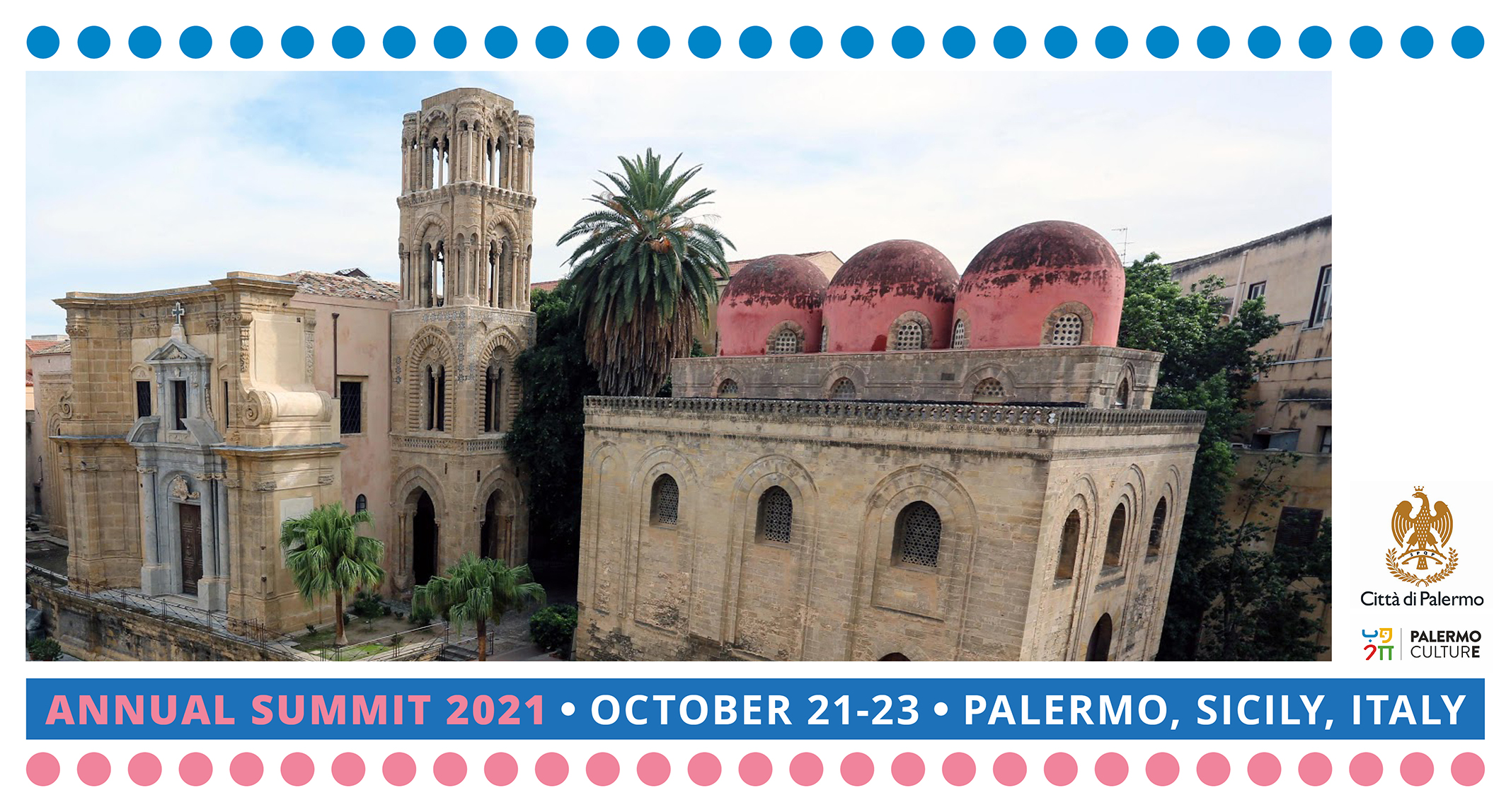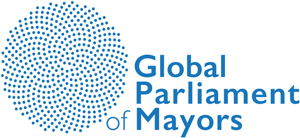
GPM Summit 2021, Palermo, Italy
RESET: CITIES LEADING IN A NEW ERA
ONLINE PROGRAMME
Thursday, 21 October, 15.00 – 18.00 hrs CEST
Friday, 22 October, 14.30 – 18.15 hrs CEST
To download the pdf of the online summit click here.
This year’s GPM Annual Summit will address how cities are rebuilding in the wake of the Covid- 19 pandemic. The event explores the role of mayors in advocating for and implementing policies with the objective of improving the living conditions of city residents, as well as ensuring that recovery from the pandemic is inclusive, just, and green. This summit highlights the importance of cooperation between cities in the Global South and Global North in tackling global challenges. The theme builds on the work of the GPM over the last fifteen (15) months on the post-Covid city.
Themes for the debates:
-
-
- Governance
- Climate Migration
- Public Health Policies
- Culture: Re-Imagining Urban Environments
- Local Economies
-
THURSDAY, 21 OCTOBER
15.00 – 18.00 hrs CEST
15.00 – 18.00 hrs CEST
Moderator:
Ivo Daalder, President Chicago Council on Global Affairs USA, Chair Advisory Committee GPM
15.00 – 15.30
- Opening by GPM Chair Mayor Kurz (Mannheim, Germany) and Host City Mayor Orlando (Palermo, Italy)
- Announcement of recipient of Dr. Benjamin Barber Global Cities Award 2021
15.30 – 16.30
- Plenary Debate on Governance:
Cities Leading: Rethinking Global Governance
Governance is at the heart of the work of the GPM. This year, the debate on governance will focus on empowering cities globally through one message: enough talking and more action. Although many acknowledge the importance of cities in addressing global challenges, cities are too often marginalized in global policy agendas. This session showcases the significance of cities by highlighting the changing role of urban governance in confronting global problems and crises. The session will examine three key priority areas: reinforcing national-local collaboration, building global multi-stakeholder partnerships, and engaging with a wide range of stakeholders to unlock an inclusive recovery and build resilience. This session will also shape the GPM’s internal discourses and its positioning towards organizations like the United Nations (UN), UN-Habitat, and Global Taskforce, as well as key events including the United Nations Climate Change Conference (COP) and World Urban Forum (WUF).
Speakers
- Introductory statement by Aziza Akhmouch, Head of Local Division on Cities, Urban Policies and Sustainable Development, OECD
- Grace Mary Mugasa, Minister of State for Public Services, former mayor of Hoima, Uganda, GPM Honorary Member
- Maimunah Sharif, Executive Director, UN Habitat
- Peter Kurz, mayor of Mannheim, Germany, GPM Chair
- Rohey Malick Lowe, mayor of Banjul, the Gambia, Chair African Capital Cities Sustainability Forum (ACCSF), member of the GPM Executive Committee
- Marcin Krupa, mayor of Katowice, Poland, member of the GPM Executive Committee, host city of the World Urban Forum (WUF) in 2022
- Alec von Graffenried, mayor of Bern, Switzerland, GPM member
16.30-16.45
- Break
16.45 – 17.45
- Plenary Debate on Climate Migration:
Cities as Global Leaders on Climate Migration
In an urbanizing world, cities are the main sanctuaries for the growing number of people affected by climate and environmental change. Cities, as hosts to many migrants, have a mandate and a responsibility to provide for the needs of their residents, including migrants, and to support the newcomers’ integration. In the absence of global leadership and locally identified protection programs, some cities and nations are facing complete destruction, with developing countries and vulnerable communities being hardest hit by the environmental crises. This session recognizes that climate change is reality, and can be slowed but not stopped by the international community’s commitments to reducing emissions and transitioning toward renewable energy. As such, we must build resilience and advocate for inclusive adaptation programs by linking local knowledge and global resources through locally situated leaders. This includes seeking out and integrating their local knowledge, expertise, and needs into national policy actions, and providing the tools and resources cities need to provide direct services to migrants in their community, regardless of legal status.
Speakers
- Introductory statement by Michele Klein Solomon, Regional Director for Central and North America and the Caribbean, IOM
- Ricardo Rio, Mayor of Braga, Portugal, member of the GPM Executive Committee and Treasurer
- William Peduto, mayor of Pittsburgh, USA
- Michael Delafosse, mayor of Montpellier, France
- Manuel d’Araujo, mayor of Quelimane, Mozambique
- Fabrice Brad Rulinda, mayor of Entebbe, Uganda
- Landing B. Sanneh, mayor of Mansakonko Council, the Gambia, GPM member
- Kathy Baughmann McLeod, Director Atlantic Council’s Adrienne Arsht-Rockefeller Foundation Resilience Center
17.45
- Conclusions of the debates
18.00
- End of the 1st GPM Summit Day programme
Interactive polling may be used during the plenary sessions to assess the opinions of participants.
FRIDAY, 22 OCTOBER
14.30 – 18.15 hrs CEST
14.30 – 18.15 hrs CEST
Moderator:
Rachel Launay, Country Director Italy, the British Council
14.30 – 14.45
- Opening 2nd Summit day by GPM Chair Mayor Peter Kurz (Mannheim, Germany)
Keynote speakers:
- Ellen Johnson Sirleaf, former President of Liberia, first female Head of State in Africa, and winner of the 2011 Nobel Prize for Peace
- Dr. Graham Alabaster, Head UN-Habitat Office, Geneva, former UN-Habitat liaison with WHO
14.45 – 15.45
- Plenary Debate on Public Health:
Urban pandemic response: global vaccination
The Covid-19 pandemic has highlighted the critical role that cities play in protecting health, not just of local residents, but also of national and global populations. Cities have been on the frontline of the Covid-19 pandemic, and mayors have worked tirelessly to protect their populations. Focusing on global health vaccine distribution, this session explores urban health policies regarding accessibility and affordability of Covid-19 vaccines. The Global Parliament of Mayors believes cities have a powerful role to play in making vaccines and other public health interventions – in particular those which aim to foster broader health and socioeconomic wellbeing – inclusive, equitable, and rooted in the needs of their communities.
Speakers
- Introductory statement by dr. Nathalie Laure Roebbel, Head, Urban Health, Social Determinants of Health, World Health Organization
- Rebecca Katz, Director, Center for Global Health Science and Security, Georgetown University, Washington, USA
- Steve Benjamin, mayor of Columbia, SA/USA, GPM Vice Chair
- Geoffrey Ngiriker, mayor of Nebbi, Uganda, GPM member
- Baikuntha Nath Neupan, mayor of Vyas, Nepal, member of the GPM Executive Committee
- Marie Angele Meyanga, mayor of Afanloum, Cameroon, GPM member
- Solomon Mguni, mayor of Bulawayo, Zimbabwe
- Hubert Bruls, mayor of Nijmegen, the Netherlands, GPM member
- Emmanuel M Goll, mayor of Kakata, Liberia
- Zahid Badroodien, Councillor Cape Town, South Africa
- Fleur Hassan Nahoum, deputy mayor of Jerusalem, Israel
16.00 – 16.45
- Plenary Debate on Culture:
Re-imagining urban environments
This session of the summit develops a compelling narrative that highlights the necessary steps to be taken by cities in the aftermath of the Covid-19 pandemic. Mayors will discuss the need for new mobilizing projects, including the use of arts and culture, festivals, as well developing an environment for digital events in the post-pandemic era. With lessons learnt from the pandemic regarding inequalities, the reconfiguration of public spaces is needed. These efforts should be shaped through participatory processes.
Speakers
- Introductory statement by dr. Doris Sommer, Director of the Cultural Agents Initiative, Harvard University
- Alexandra Dulkiewiecz, mayor of Gdansk, Poland
- Gonzalo Olabarria Villota, deputy mayor of Bilbao, Spain
- Erion Veliaj, mayor of Tirana, Albania
- Annekatrin Klepsch, deputy mayor of Dresden, Germany
- Leoluca Orlando, mayor of Palermo, Italy, member of the GPM Executive Committee, host city GPM Annual Summit 2021
- dr. Antanas Mockus, former mayor of Bogota, Columbia
- Dr. Ege Yildirim, Urban planner and heritage conservation specialist, Istanbul, Turkey
16.45-17.00
- Break
17.00 – 18.00
- Plenary Debate on Local Economies:
Resetting our Local Economies
The Covid-19 pandemic has stalled most of the processes upon which globalization thrives and thus, creates the need for significant change. In this session, the discussion explores the resetting of our local economies. It investigates how the pandemic has affected the global economy by mandating a revitalization of more local/localized forms of economic prosperity. Following this line of thought, the session juxtaposes universal services and further addresses the short supply chains and circularity oriented to basic needs. It calls for a new basis for post-Covid redevelopment and social inclusion; development of local enterprises at the neighbourhood level; and rooting for local public service partners.
Speakers
- Introductory statement by John Austin, Director, Michigan Economic Center, Nonresident Fellow Brooking Institution & Chicago Council on Global Affairs
- Jefferson Koijee, mayor of Monrovia, Liberia, member of the GPM Executive Committee
- Hélder Sousa Silva, mayor of Mafra, Portugal, GPM member
- Jakub Mazur, deputy mayor of Wroclaw, Poland, GPM member
- Claudio Benjamín Orrego Larraín, governor Santiago Metropolitan Region, Chile
- David Balaba, former mayor Iganga, Uganda
- Óscar Escobar, mayor of Palmira, Colombia
- Fongu Cletus Tanwe, mayor of Bamenda city, Cameroon
- Bryan Barnett, Mayor of Rochester Hills, USA, GPM member, former President USCM
18.00 – 18.15
- Conclusions of the Summit debates and next steps
18.15
- End of GPM Summit 2021
Interactive polling may be used during the plenary sessions to assess the opinions of participants.

